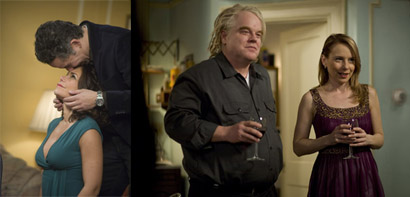by Jen McNeely
We could watch Philip Seymour Hoffman eat a carrot and be mesmerized. Every wrinkle in his face, every tilt of his eyebrow, the way saliva hangs off his lips –he is as good as an actor can ever hope to get. Whether the desperate masturbating loner in Happiness, the obnoxious rich kid in Talented Mr. Ripley or the charismatic Capote, Hoffman absorbs every inch of the characters he plays. He has more than proved himself as an actor and now debuts his talents as a director in Jack Goes Boating, in which he also stars.
Premiering at TIFF earlier this month, Jack Goes Boating tells the story of two working class couples in New York City and the daily challenges they go through to maintain, grow or fuck up their relationships. This is a film for those who are interested in the quirks, motivations and tribulations of everyday people – the unglamorous folks that intrigue you on a crowded subway; more torn than polished. When a plot isn’t full of chases, elaborate costumes or tidal waves, it takes formidable actors to hold audience attention. But the challenge is probably why Hoffman chose this project – and he picked first-class company to work with, his friends.
Amy Ryan plays Connie, Jack’s (Hoffman) love interest, they have been set up by by Lucy (Daphne Rubin-Vega), Connie’s boss, and her partner Clyde (John Oritz), Jack’s best friend. Both Jack and Clyde are limo drivers, while Lucy and Connie work at a dubious phone sales centre that specializes in after life decisions.
Known best for her role as heroine addicted, HIV+ Mimi in Rent, we sat down with Daphne-Rubin Vega, who plays the fiery, hash-toking, no bull-shitting tell it like it is Lucy, to find out what it was like to work with Hoffman. Vega gushes that it was an absolute dream for an actor. “I could trust him, I could pick his brain, I could feel safe with him pushing me, you know, really pushing me. It’s not an abusive thing, it’s to get the very best.”
Both members of New York City’s prestigious LAByrinth Theater Company, Rubin Vega has worked with Hoffman for years, and together they performed Jack Goes Boating on stage back in 2007. “I’ve seen his direction in theatre and I think he’s a very intelligent individual and an intelligent actor of course, with wonderful taste and care.” Says Vega.
It was while Hoffman was driving Vega and a friend back from a two-week intensive acting course in Vermont that he mentioned wanting to turn Jack Goes Boating into a film, and hoped that she would be cast as Lucy. Although excited, Vega explains, “There were a lot of politics, him wanting me to do it but with no guarantees, so the day I received a film script was a big day.”
Eleven pages of that script are devoted to one insanely packed scene where a dinner party, in the confines of a small apartment, catapults into unthinkable intense drama. Each character is pushed to the absolute limit. Tempers flare, near violence ensues and as an audience member, we are buckled with anxiety. “We dedicated about a week to it, “ says Vega “and shot it near the end. It had been mapped out meticulously before we walked in and rolled up our sleeves. It was such a wonderful experience to work on this project with people that I actually, personally, happen to feel very strongly about, positive. And then to end the project with this high drama, it felt…it felt a little dirty, like I needed to take a shower and wash all that drama off.” Vega needed a shower, we almost had to hurl.
The characters are deeply complicated, bruised and poignant, which Vega attests to the way Hoffman pushed the actors, “He’s always on a quest for more clarity. As a result you have these characters that are multi-faceted, that contradict themselves, just like we do. They sparkle with humanity.”
Perhaps more stained than sparkled, Jack Goes Boating is an absolute feat in acting “The bar was set high, I was in extremely good company, I couldn’t wish for a better company of actors to work and play with.” Neither could we.



 Follow Us On Instagram
Follow Us On Instagram
